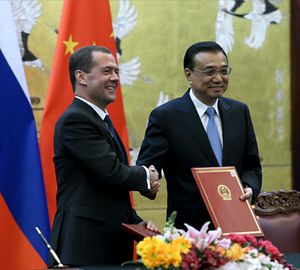It’s been a busy week for Russian Prime Minister Dmitry Medvedev. After attending the annual Shanghai Cooperation Organization heads of government meeting in Zhengzhou, China on Tuesday, Medvedev headed to Wuzhen for the second annual World Internet Conference on Wednesday. Today, Medvedev headed to Beijing to sit down with Chinese Premier Li Keqiang (who also hosted the SCO meeting) for the 20th edition of the China-Russia Prime Ministers’ Regular Meeting.
It’s been a rough year for China-Russia relations, especially on the economic front. Thanks to China’s economic slowdown, plunging global oil prices, and Russia’s struggles with Western sanctions, bilateral trade over the first six months of 2015 dropped by 30 percent year-on-year. That’s despite a 15 percent increase in Russian oil exports to China over the first six months of 2015 compared to the same period of 2014 – a clear sign of how decimated oil prices are affecting the trade relationship. Bilateral investment between the two countries has also declined sharply, down by 20 percent year-on-year. In 2011, Medvedev (then Russia’s president) and then-Chinese President Hu Jintao set a goal of doing $100 billion in bilateral trade by 2015; financial and economic realities have destroyed any chance of reaching that mark.
As figures from TASS make clear, Russia is far more reliant on China economically than the other way around – China is Russia’s largest trading partner, accounting for 11 percent of Russia’s total foreign trade in 2014. Meanwhile, Russia contributed only 2.2 percent of China’s foreign trade as Beijing’s ninth-largest trading partner last year (and Russia’s ranking might drop to 15th by the end of 2015). Russia is particularly dependent on China now, thanks to sanctions from the West that limit Moscow’s ability to export energy resources to Europe (and retaliatory sanctions from Russia that make it more reliant on China for food imports).
With that in mind, Moscow is particularly keen to finalize new pipelines that will allow it to export more oil and gas to China. Medvedev made some progress on this front in Beijing. Russian oil giant Rosneft and Sinopec signed a memorandum of understanding on projects in East Siberia. The two firms will conduct “a detailed pre-feasibility and concept design study with respect to a potential gas and petroleum chemicals joint venture” in the Yurubcheno-Tokhomskiy gas fields, according to a press release from Rosneft. The MOU is a follow-up of a previous agreement to jointly develop the Russkoye and Yurubcheno-Tokhomskiy fields that was signed in September, coinciding with President Vladimir Putin’s visit to China.
In addition, China National Petroleum Corporation (CNPC) and Gazprom signed an agreement “on the design and construction of the cross-border section of China-Russia east-route natural gas pipeline,” according to Xinhua. That’s another step forward on a $400 billion deal signed in May 2014 that will see Russia provide natural gas from Siberia to Chinese markets.
“The slew of deals signed between China and Russia is a testimony of a higher level of our relationship, and we are determined to ensure their implementation,” Li told Medvedev. Indeed, China and Russia are very much in the “implementation” stage – trying to see through deals that have already been reached despite what Li called “downward pressure on the economy.”
In his own speech, Medvedev agreed that the two sides must overcome economic difficulties. “I totally support what Mr Li Keqiang said about the need to react to the current economic environment and to the weakness and volatility of markets,” he said. “We need to find new solutions and directions for cooperation, including in dealing with a number of challenges that our countries and economies are facing.”
China and Russia have struggled for years to make their economic relationship live up to their increasingly close political and military relations (an inversion of the problem China has with many of its other neighbors, such as South Korea). The lesson of 2015 is that this will not be an easy process, despite optimistic numbers and a slew of new deals coming out of Moscow and Beijing. Trade relations take time to build, particularly since Sino-Russian trade is currently centered on the infrastructure-heavy energy industry.
But if Medvedev’s visit to China is any indication, both sides are serious about the effort. He told People’s Daily in an interview that Russia and China “hope to launch major projects within a few years, which will add tens of billions of dollars to our trade and will make it possible to regain a steady positive trajectory.”

































